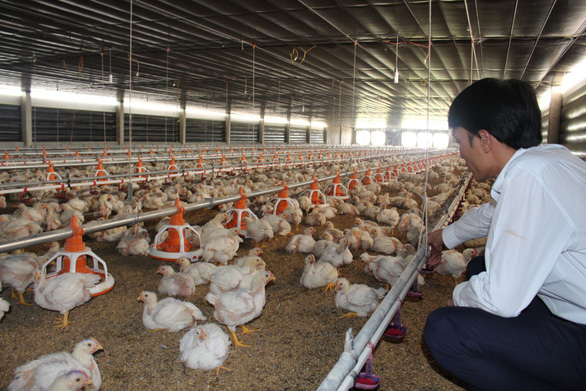Vietnamese chicken exporters will find it difficult to take advantage of the opportunity to export chicken to Singapore and Malaysia even though the city-state is facing a shortage due to Kuala Lumpur’s announcement to suspend chicken exports to stabilize its domestic supply, according to some local experts in the industry.
“There is no way that Malaysia would stop chicken exports. I think there must be a major reason behind its move,” Nguyen Kim Doan, vice-chairman of the Dong Nai Livestock Association, told Tuoi Tre (Youth) newspaper last week.
Before Malaysia announced its ban on chicken exports, chicken farmers in Vietnam had been suffering losses for a couple of years, causing breeders to reduce the number of broodstock chickens.
Prior to Malaysia’s export ban, Vietnam’s chicken prices were on the rise.
However, when Malaysia imposed its prohibition, Vietnam still could not manage to meet the demand of other markets due to the broodstock undersupply.
Because of lack of supply, Singapore, which relies on Malaysia for a third of its poultry imports, will import chicken from other countries, especially European countries, Doan said.
Therefore, Doan concluded that Vietnamese firms would find it hard to export the fowl right now.
Although they can export chicken, it would take time to raise enough poultry to meet demand.
“It usually takes around five months to restore an adequate volume of broodstock chickens, and two more months to raise the fowl for meat. So, it will be a bit late to cope with the current shortage of chicken,” he explained.
A chicken exporter based in Ho Chi Minh City asserted that local firms could not seize this opportunity to ship chicken overseas.
A representative of this chicken exporter attributed the firm’s falling volume of exported chicken to dwindling supply.
“We learned that Malaysian firms had to suspend chicken exports to ease domestic undersupply of the meat,” he said.
Vietnam is facing the same fate.
The prolonged COVID-19 pandemic has left both purchasing power and chicken farming in a tough position.
Meanwhile, animal feed prices are constantly soaring, forcing many chicken farmers to suspend their businesses.
“Everyone can see the opportunity to ramp up chicken exports now, but it takes time to get chicken available for export,” the representative added.
Echoing this viewpoint, Ho Phong Thanh, a poultry expert in southern Dong Nai Province, said the current chicken supply at home is just enough for domestic consumption and not available for export.
Besides, export procedures are time-consuming as exporters have to work to ensure they meet various requirements and standards for shipping chicken abroad.
Meanwhile, none of the plants and cold storage facilities in Vietnam meet export standards.
Due to these factors, Thanh stressed that it may be impossible to export chicken at present.
Nguyen Thi Tam, a chicken farmer in Dong Nai, said she has scaled down her annual brood of over 200,000 chickens since 2020.
According to Tam, raising chickens for meat or eggs is no longer appealing to farmers, since animal feed prices have increased and the local market is unstable.
“Someone told me to restore my chicken brood to meet export demand, but I think it’s not time for reinvestment now,” Tam said.
Like us on Facebook or follow us on Twitter to get the latest news about Vietnam!


















































